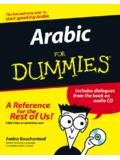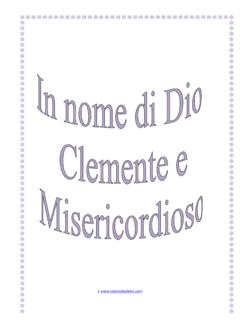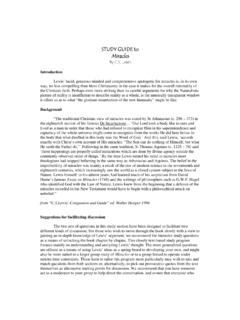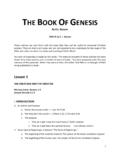Transcription of The Bible, The Qur'an and Science
1 The Bible, The Qur'an and Science La Bible, le Coran et la Science The Holy Scriptures Examined In The Light Of Modern Knowledge By Dr. Maurice Bucaille Translated from French By Alastair D. Pannell and The Author 1 Foreword n his objective study of the texts, Maurice Bucaille clears away many preconceived ideas about the Old Testament, the Gospels and the Qur'an . He tries, in this collection of Writings, to separate what belongs to Revelation from what is the product of error or human interpretation.
2 His study sheds new light on the Holy Scriptures. At the end of a gripping account, he places the Believer before a point of cardinal importance: the continuity of a Revelation emanating from the same God, with modes of expression that differ in the course of time. It leads us to meditate upon those factors which, in our day, should spiritually unite rather than divide-Jews, Christians and Muslims. I As a surgeon, Maurice Bucaille has often been in a situation where he was able to examine not only people's bodies, but their souls.
3 This is how he was struck by the existence of Muslim piety and by aspects of Islam which remain unknown to the vast majority of non-Muslims. In his search for explanations which are otherwise difficult to obtain, he learnt Arabic and studied the Qur'an . In it, he was surprised to find statements on natural phenomena whose meaning can only be understood through modern scientific knowledge. He then turned to the question of the authenticity of the writings that constitute the Holy Scriptures of the monotheistic religions.
4 Finally, in the case of the Bible, he proceeded to a confrontation between these writings and scientific data. The results of his research into the Judeo- christian Revelation and the Qur'an are set out in this book. 2 Table of Contents Foreword 3 Introduction 3 The Old Testament 9 I. Genral Outlines II. The Books of the Old Testament 13 III. The Old Testament and Science Findings 23 IV. Position Of christian Authors With Regard To Scientific Error In The Biblical Texts 33 V. Conclusions 37 38 The Gospels I.
5 Introduction II. Historical Reminder Judeo- christian and Saint Paul 41 III. The Four Gospels. Sources and History 44 IV. The Gospels and Modern Science . The General Genealogies of Jesus 62 V. Contradictions and Improbabilities in the Descriptions 71 VI. Conclusions 79 The Qur'an and Modern Science 81 I. Introduction II. Authenticity of the Qur'an . How It Came To Be Written 91 III. The Creation of the Heavens and the Earth 96 IV. Astronomy in the Qur'an 108 V. The Earth 122 VI. The Animal and Vegetable Kingdoms 133 VII. Human Reproduction 142 Qur'anic and Biblical Narrations 151 I.
6 General Outlines II. The Flood 153 III. The Exodus 157 The Qur'an , Hadith and Modern Science 172 General Conclusions 176 Endnotes 178 Back Cover 185 3 Introduction ach of the three monotheistic religions possess its own collection of Scriptures. For the faithful-be they Jews, Christians or Muslims-these documents constitute the foundation of their belief . For them they are the material transcription of a divine Revelation; directly, as in the case of Abraham and Moses, who received the commandments from God Himself, or indirectly, as in the case of Jesus and Muhammad, the first of whom stated that he was speaking in the name of the Father, and the second of whom transmitted to men the Revelation imparted to him by Archangel Gabriel.
7 E If we take into consideration the objective facts of religious history, we must place the Old Testament, the Gospels and the Qur'an on the same level as being collections of written Revelation. Although this attitude is in principle held by Muslims, the faithful in the West under the predominantly Judeo- christian influence refuse to ascribe to the Qur'an the character of a book of Revelation. Such an attitude may be explained by the position each religious community adopts towards the other two with regard to the Scriptures.
8 Judaism has as its holy book the Hebraic Bible. This differs from the Old Testament of the Christians in that the latter have included several books which did not exist in Hebrew. In practice, this divergence hardly makes any difference to the doctrine. Judaism does not however admit any revelation subsequent to its own. Christianity has taken the Hebraic Bible for itself and added a few supplements to it. It has not however accepted all the published writings destined to make known to men the Mission of Jesus. The Church has made incisive cuts in the profusion of books relating the life and teachings of Jesus.
9 It has only preserved a limited number of writings in the New Testament, the most important of which are the four Canonic Gospels. Christianity takes no account of any revelation subsequent to Jesus and his Apostles. It therefore rules out the Qur'an . The Qur'anic Revelation appeared six centuries after Jesus. It resumes numerous data found in the Hebraic Bible and the Gospels since it quotes very frequently from the 'Torah'[1] and the 'Gospels.' The Qur'an directs all Muslims to believe in the Scriptures that precede it (Sura 4, verse 136).
10 It stresses the important position occupied in the Revelation by God's emissaries, such as Noah, Abraham, Moses, the Prophets and Jesus, to whom they allocate a special position. His birth is described in the Qur'an , and likewise in the Gospels, as a supernatural event. Mary is also given a special place, as indicated by the fact that Sura 19 bears her name. The above facts concerning Islam are not generally known in the West. This is hardly surprising, when we consider the way so many generations in the West were instructed in the religious problems facing humanity and the ignorance in which they were kept about anything related to Islam.

















